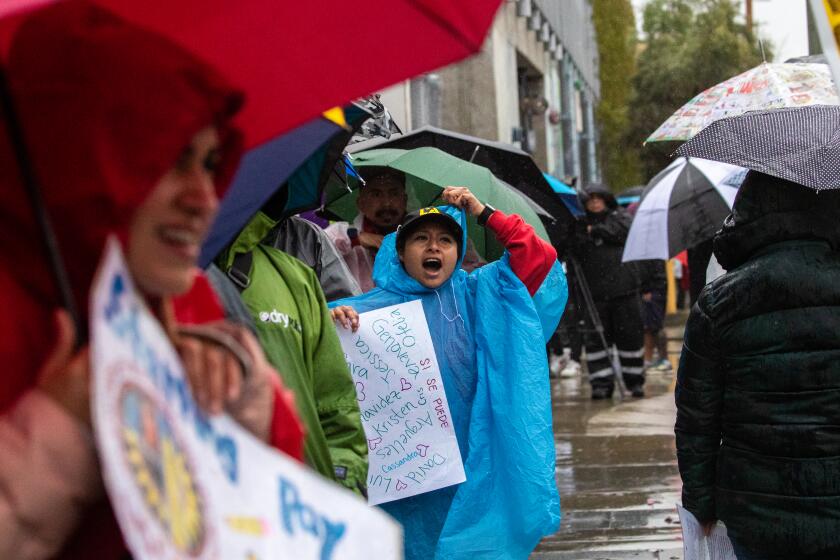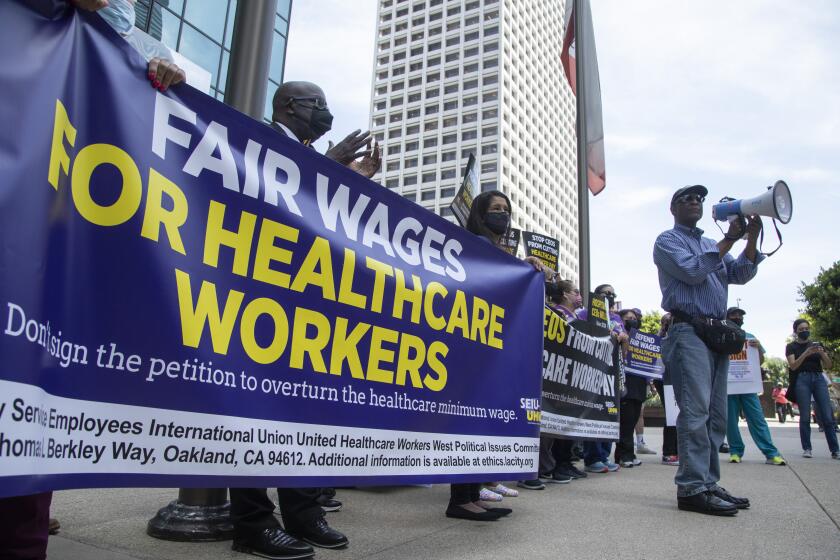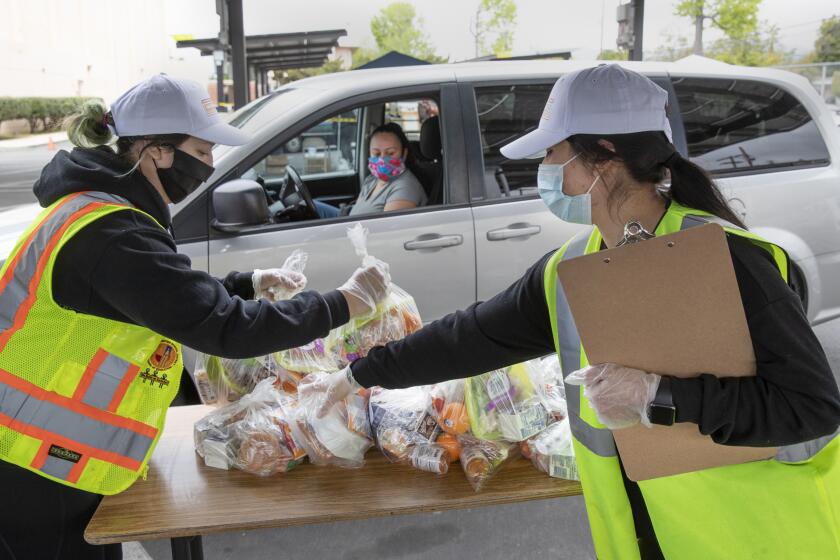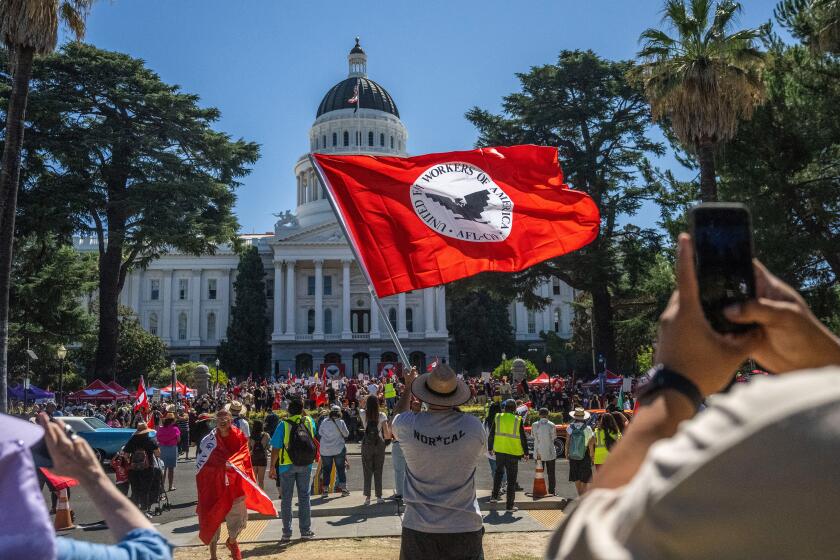‘Fed up’ California workers across industries demand more amid rising cost of living
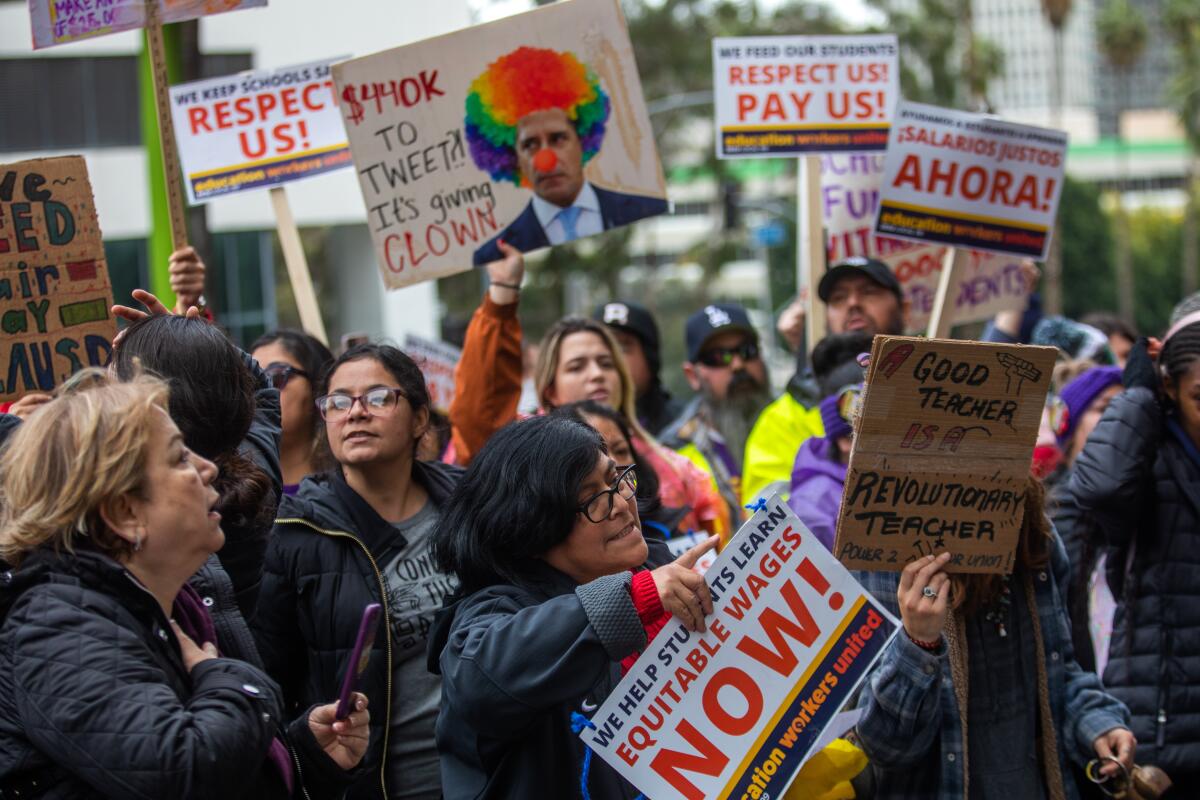
- Share via
Fast-food cooks and cashiers. Caretakers. Housekeepers. Hospital staff. School bus drivers. Custodians. State employees.
Workers from all kinds of industries are demanding more in wages and benefits in order to keep up with the rising cost of living in California. They are backed by a wave of Democrat-led legislation making its way through the state Capitol — converging with ballot measures and funding requests from Gov. Gavin Newsom — to create a workers’ rights moment that seems unique even for one of the most union-friendly states in the nation.
The calls come as support staff at Los Angeles Unified — the country’s second-largest school district — walked out of classrooms on strike and state workers rallied outside the Capitol in Sacramento this week.
“We used to be able to afford to go out to eat, but even fast food is expensive ... we would donate to the food banks and now we’re finding ourselves going to those same food banks to get things for ourselves,” Tammy Rodriguez, an employee of the Department of Motor Vehicles and a member of SEIU Local 1000, said through tears on the steps of the Capitol on Monday ahead of contract negotiations with the state. “As state employees, we should be able to afford just everyday things.”
Earlier this month, domestic workers such as nannies and housekeepers stood on those same steps pushing for the passage of a bill by state Sen. María Elena Durazo (D-Los Angeles) that would grant them the occupational safety protections offered to most other employees in the state.
“I actually suffered a miscarriage because of the level of dangerous conditions that I experienced,” Mirna Arana, a member of the California Domestic Workers Coalition, said in Spanish through a translator, describing cleaning up to 10 houses a day at the peak of her workload. “No other workers should experience what I experienced.”
LAUSD bus drivers, custodians, teachers, classroom aides and cafeteria workers join wet, cold picket lines at shuttered schools across the district.
Tia Orr, executive director of Service Employees International Union California, said that while the state has “always been the tip of the spear” when it comes to workers’ rights, lingering pandemic frustrations from those deemed essential workers, combined with inflation pressures, has created special momentum.
Bills introduced this year include a mandate for a $25 minimum wage for health workers; a proposal to more than double paid sick time; and new regulations for fast-food franchisees regarding wages and hours. Meanwhile, a ballot measure will ask voters next year if they support raising the statewide minimum wage to $18 an hour, which, if passed, would make it the highest in the nation.
“We are moving forward with an aggressive agenda that we believe is game changing and hope to shift the balance of power toward the worker,” said Orr, who represents 700,000 service workers. “People are fed up with corporate power. And it’s going to take more than wages: They want a clear, strong voice and a seat at the table.”
California’s already profound income inequality worsened during the COVID-19 pandemic as the state’s rich got richer and the poor got poorer. Income is often not enough to meet basic needs in the state, according to a report by the Public Policy Institute of California released this month.
Pro-union Democratic state lawmakers are set to introduce legislation mandating a raise for health workers, likely setting up a battle with hospitals and clinics.
Families in the state’s wealthiest income bracket earn 11 times as much as families at the bottom, $291,000 versus $26,000 respectively, according to the report. In 1980, that gap was smaller: The highest-earning families earned seven times as much as low earners then. Today’s gap reflects 63% income growth for the wealthiest over the last 40 years and a mere 7% growth for the poorest, according to the report.
That growing divide has sparked outrage from lower-earning workers aiming to hold their wealthier employers accountable, said Kent Wong, director of the UCLA Labor Center.
“We’ve seen a huge rise in workers’ organization and protesting,” he said, pointing to a historic strike by University of California workers launched in November that lasted weeks and led to wage gains. “During the pandemic, we had such a contradiction where people were being celebrated as essential workers on the front lines, yet they were making poverty wages. Now, this is a moment in time when workers are really demonstrating their dissatisfaction.”
More strikes could be on the horizon. The Writers Guild of America is in negotiations with Hollywood studios, and California State University workers are demanding more in wages and benefits.
Other bills introduced this year include a proposal to allow in-home providers who care for Californians who are elderly or have disabilities to negotiate with the state over wages and benefits — just as Newsom allowed child-care providers to do in 2021.
A bill by state Sen. Lola Smallwood-Cuevas (D-Los Angeles), a former union organizer, aims to protect workers who report labor violations, including complaints of wage theft or unequal pay, from being fired or harassed.
Investment in workers now prevents bigger costs to the state in the long run, as the public safety net must make up for the gaps left by employers, she said.
“Work is not doing what it used to do, which is sustain families and communities, so we are doing that work as policymakers and our state budget is being overwhelmed because we have a business model that’s not providing basic needs,” Smallwood-Cuevas said.
California families will no longer receive extra CalFresh benefits given during the COVID-19 pandemic.
The California Chamber of Commerce has labeled many employee-focused bills as “job killers,” warning that they could have unintended — and expensive — consequences for employers and could hamper business growth and employment in the state.
California is home to some of the nation’s strongest employee rights laws, and Jennifer Barrera, president and chief executive of the chamber, has concerns about enacting more workplace laws, especially with across-the-board regulations for different types of industries.
“California has long been viewed as the state with the most protective and stringent work requirements out of anywhere in the country,” Barrera said. “For the most part, we aren’t necessarily opposed to the underlying policies. It’s really about the way they get implemented. How do you make all of this work in the workplace without the potential threat of a devastating lawsuit that could put you out of business?”
State Sen. Brian Dahle (R-Bieber) said California employers will struggle to afford to compete with an ever-increasing minimum wage. Instead, lawmakers should focus on policies that lower the cost of living.
He pointed to Republican-backed proposals to decrease energy and gas costs that have been rebuffed over regulatory and other concerns.
“You have to pay a higher wage because people can’t afford to live here. Food costs are going up, rent is exploding. At the end of the day, wages don’t fix the problem, you have to drive down the cost of living,” said Dahle, who lost his bid for governor last year. “If we can reduce their electric bill, it’s like giving them a five dollar an hour raise.”
Dahle doubted that any labor-backed bills will face scrutiny in the Democratic-majority Legislature.
“Let’s just be frank, the unions in this building, there’s no doubt about it, they’re powerful,” he said.
Influential labor organizations poured millions into legislative races last year to help union-friendly candidates. SEIU helped its candidates of choice by pumping nearly $4 million into eight independent expenditures alone.
Newsom has been friendly to labor: He signed a first-in-the-nation law on Labor Day that created a council to set new standards for fast-food working conditions and wages. That plan is now on hold after restaurant and business trade groups gathered enough signatures to get a measure on next year’s ballot to ask voters to overturn it.
He also signed a law that makes it easier for farmworkers to join unions.
After weeks of pressure and a 24-day march by farmworkers and supporters, California’s governor signed legislation he previously hinted he’d veto.
But he could pump the brakes as he has warned against big, ongoing investments amid a projected budget deficit. He has clashed with unions before, including the State Building and Construction Trades Council of California, a formidable political player that represents plumbers, electricians, ironworkers and construction workers. He disappointed the powerful California Nurses Assn. when he backed off of promises of single-payer healthcare.
Joe Sanberg, a Los Angeles investor and antipoverty activist who spearheaded the 2024 minimum wage ballot measure, is less optimistic about the success of workers’ rights bills, especially when it comes to wages.
Taking the minimum wage directly to voters was necessary, said Sanberg, who considered a 2020 presidential run and said he is “undecided” on whether he will run for governor in 2026.
“Anyone who has confidence in Gavin Newsom supporting higher wages is foolhardy,” he said. “Why hasn’t it already been done? What’s standing in the way?”
More to Read
Sign up for Essential California
The most important California stories and recommendations in your inbox every morning.
You may occasionally receive promotional content from the Los Angeles Times.
